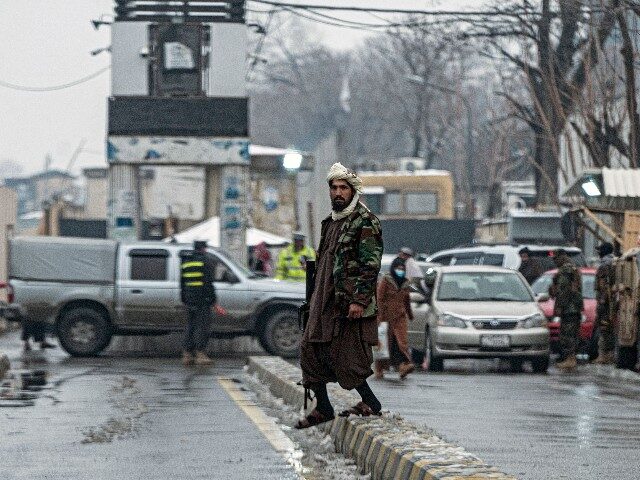The Islamic State on Wednesday took credit for a suicide bomb attack near the Afghan Foreign Ministry in Kabul that killed at least five people and wounded 40 more.
The Chinese Foreign Ministry condemned the attack, which reportedly targeted a Chinese delegation, while downplaying the carnage.
The attacker detonated his bomb after he unsuccessfully attempted to enter the Foreign Ministry building at roughly 4:00 p.m. local time, according to Taliban officials. Eyewitnesses reported seeing a man with a bag and a rifle brazenly marching up to the building.
Sky News noted the four o’clock hour is “a busy time of day” in that “heavily-fortified area” of Kabul, which boasts several government ministries on the same street. Photos posted on social media showed security forces attending to at least nine visible dead and wounded.
The Taliban police chief of Kabul claimed there were five casualties, but evidently, few observers accept that casualty count. The BBC quoted an Italian humanitarian agency called Emergency NGO, which said its Kabul clinic treated at least 40 injured people on Wednesday and expected more casualties.
The Islamic State, using its Amaq “news” channel on the Telegram messaging platform, claimed at least 20 people were killed in the attack, including “several diplomatic employees.”
“Today, my uncle, a senior diplomat, my source of inspiration and strength is brutally killed at the gate of ministry of Foreign Affairs during a suicide attack in Kabul, Afghanistan,” Afghan journalist Aisha Ahmad said on Twitter, adding weight to the Islamic State’s claims.
Another Afghan journalist, Syed Zabiullah Langari, reported that several “young Afghan diplomats” were killed in the attack.
American University of Afghanistan lecturer Obaidullah Baheer told Al Jazeera News it was “troubling,” but not surprising, that the Taliban would conceal the true number of dead and wounded.
“We have seen the Taliban do this before. It does not help the security of the city to deny numbers of the actual casualties. So, a lot of questions, little answers,” he said.
Baheer also found it curious that the attacker was apparently able to get past “multiple checkpoints” that normally require “specific documents” to access the secure area where the Foreign Ministry was located.
“There was supposed to be a Chinese delegation at the Foreign Ministry today, but we don’t know if they were present at the time of the blast,” Taliban Deputy Minister of Information and Culture Muhajer Farahi told Agence France-Presse (AFP) on Wednesday.
Asked about this report on Thursday, Chinese Foreign Ministry spokesman Wang Wenbin said that “as far as we have learned, there have been no Chinese casualties in this terrorist attack.”
“China firmly opposes all acts of violent terrorism. We strongly condemn this incident, mourn for the victims and extend sympathies to the people whose family members were killed and those who were injured in the incident,” said Wang.
Islamic State gunmen and bombers attacked a hotel in Kabul on December 12, killing at least three people and injuring 21 more. The hotel was known as a favorite of visiting Chinese nationals, five of whom were wounded in the attack. The incident drew considerable attention on social media after an eyewitness video showed someone attempting to climb out of the burning “Chinese hotel” and falling three stories to meet an uncertain fate.
After the hotel attack, the Chinese government advised its citizens to leave Afghanistan. Chinese businessmen were reportedly made quite nervous by the incident, having lost their confidence in the Taliban to provide security. One of them told Reuters in December that he doubted more than 20 percent of his colleagues would return to Afghanistan after traveling for the Lunar New Year holiday.

COMMENTS
Please let us know if you're having issues with commenting.